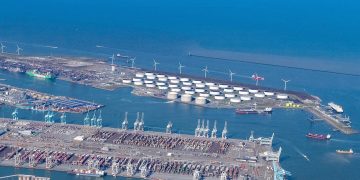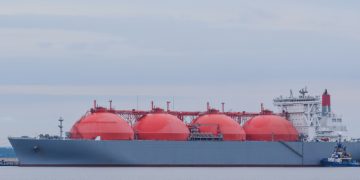In its most recent monthly safety scenario, the Swedish Club informs about a serious explosion during hatch cover repairs, resulting in multiple injuries and one fatality due to methane ignition near coal cargo.
The incident
A large cape size bulk carrier was laden with coal and was sailing towards the discharge port. It was spring with some strong winds. Cargo safety information was provided by the shipper to the Master at departure, warning about the potential for methane emission and self-heating regarding the coal cargo.
Shortly after departure the crew noticed oil leaking from a hydraulic ram on one of the forward hatch coamings. The hydraulic rams are used to jack up and lower the hatch cover panels. To repair the leaky ram, the defective parts inside the ram had to be replaced. To avoid operational hazards, the Chief Engineer decided to repair the ram during the voyage, with agreement from the Master and Chief Officer. A toolbox meeting was held before starting repairs, during which the Chief Engineer explained the repair plan and discussed the tasks involved. The team was briefed on the use of the gas torch and mechanical jack to dismantle the hydraulic ram. The Chief Engineer emphasized general safety practices, such as keeping fire extinguishers nearby, wearing personal protective equipment (PPE), and ensuring work was done in pairs for monitoring.
The toolbox meeting did not specifically address risks associated with methane gas or its potential ignition due to hot work near the coal cargo. The Chief Engineer conducted a basic risk assessment for the repairs, identifying potential hazards such as fire, high temperatures, and oil spillage. A hot work permit was issued, signed off by the Master and Chief Officer. The permit outlined the following:
- Fire-fighting equipment (CO2 extinguishers and water hoses) to be on standby.
- The repair team to wear PPE, including fire-resistant clothing.
- A designated “fire watch” to monitor for any signs of sparks or ignition.
The permit did not include a requirement to monitor the atmosphere in the cargo hold for flammable gases like methane, despite the known properties of the coal cargo. The vessel’s gas detectors, which had not been functioning for a year, had not been repaired or replaced, and no alternative gas monitoring had been arranged.
Repair work began with a team led by the 4th engineer, engine fitter and two oilers, involving hot work using a gas torch. The repair team began dismantling the hydraulic ram using the gas torch and welding equipment. The work involved high-temperature cutting, which was not directly flagged as a risk for the cargo. One retaining pin was successfully removed, and two small brackets were welded to secure the cam. Despite the use of open flames, no explosion occurred that day, likely due to low methane concentration or insufficient heat transfer to the interior of the hold.
The following day the repairs continued, but were suspended due to bad weather with strong winds and rough seas. The hatch cover repair site was exposed, making it unsafe to continue work. The hydraulic ram remained partially dismantled. The next day the weather remained poor, but the Chief Engineer decided to resume repairs in the afternoon and a new hot work permit was issued. The 4th Engineer led the same team. Heat from the cutting process transferred through the metal structure of the hatch coaming into the cargo hold, where methane gas emitted by the coal had accumulated due to lack of ventilation. The methane gas ignited, causing a violent explosion.
The explosion displaced the hatch covers of two cargo holds, releasing a large volume of black smoke. Three crew members, the 4th engineer, engine fitter and an oiler suffered severe burns and injuries due to the explosion. Their clothing and PPE were destroyed by the intense heat.
The master called for emergency assistance and a rescue helicopter was dispatched by the coastguard. It arrived and winched down a doctor. The injured crew members were evacuated to a hospital. The engine fitter later succumbed to his injuries and was declared dead at the hospital. The other crew members recovered but could not work at sea anymore.
Lessons learned
When discussing this case please consider that the actions taken at the time made sense for all involved. Do not only judge, but also ask why you think these actions were taken and could this happen on your vessel?
- What were the immediate causes of this accident?
- Is there a risk that this kind of fire could happen on our vessel?
- How could this explosion have been prevented?
- What sections of our SMS would have been breached if any?
- If procedures were breached, why do you think this was the case?
- Do our procedures make sense for the work we actually do?
- Is our SMS sufficient for preventing this kind of accident?
- Does our SMS address these risks?
- How do we ensure that there is no dangerous gas accumulation?
- How do we ensure that all relevant information regarding the cargo is shared with all concerned parties?
- Does our hot work permit take into consideration the methane hazard or the proximity to the cargo as in this case?
- Does our work permit include requirements for gas monitoring and ventilation of cargo holds?
- Does our risk assessment identify the problems in this case?
- How do we monitor that all our gas detectors work properly?
- How do we calibrate our gas detectors?
- Are all perceivable risks discussed during our toolbox meeting?
- When should a toolbox meeting be held?
- What can we learn?



























































